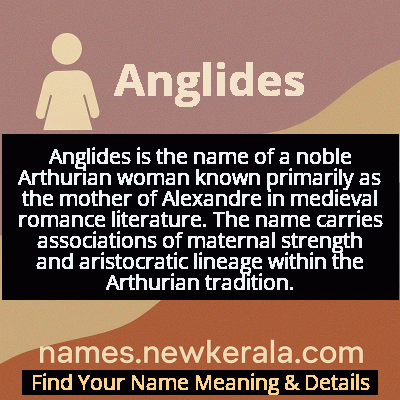Anglides Name Meaning & Details
Origin, Popularity, Numerology Analysis & Name Meaning of Anglides
Discover the origin, meaning, and cultural significance of the name ANGLIDES. Delve into its historical roots and explore the lasting impact it has had on communities and traditions.
Name
Anglides
Gender
Female
Origin
Arthurian
Lucky Number
8
Meaning of the Name - Anglides
Anglides is the name of a noble Arthurian woman known primarily as the mother of Alexandre in medieval romance literature. The name carries associations of maternal strength and aristocratic lineage within the Arthurian tradition.
Anglides - Complete Numerology Analysis
Your Numerology Number
Based on Pythagorean Numerology System
Ruling Planet
Saturn
Positive Nature
Ambitious, efficient, realistic, and authoritative.
Negative Traits
Materialistic, stressed, confrontational, and can be overly ambitious.
Lucky Colours
Dark blue, black.
Lucky Days
Saturday.
Lucky Stones
Blue sapphire, amethyst.
Harmony Numbers
2, 4, 6.
Best Suited Professions
Business leaders, managers, financial services, law enforcement.
What People Like About You
Leadership, determination, organizational skills.
Famous People Named Anglides
Anglides
Arthurian Noblewoman
Mother of Alexandre l'Orphelin and wife of King Tradelmant of North Wales
Anglides (Literary Figure)
Literary Character
Prominent figure in the Post-Vulgate Cycle and Prose Tristan, known for her tragic romance and maternal devotion
Anglides (Genealogical Figure)
Noble Ancestor
Key figure in the complex genealogical web connecting various Arthurian knights and noble families
Name Variations & International Equivalents
Click on blue names to explore their detailed meanings. Gray names with will be available soon.
Cultural & Historical Significance
In Arthurian tradition, Anglides embodies the noble matriarch whose actions and lineage directly influence the heroic journeys of subsequent generations, particularly through her son Alexandre, who becomes an important knight in his own right. Her character reflects the medieval emphasis on noble bloodlines and the crucial role women played in maintaining and transmitting aristocratic heritage, even when their stories remained secondary to the primary knightly narratives. The cultural significance of Anglides lies in her representation of the often-invisible feminine power that sustained the Arthurian world—the mothers, wives, and daughters whose choices and loyalties shaped the destinies of the more famous knights and kings.
Extended Personality Analysis
Anglides is characterized by profound maternal devotion and noble resilience, traits that define her role in Arthurian literature. As the mother of Alexandre l'Orphelin (Alexander the Orphan), she demonstrates exceptional strength in protecting and guiding her son through the complex political landscape of Arthurian Britain. Her personality reflects the ideal medieval noblewoman—graceful yet determined, compassionate yet politically astute. She possesses a quiet dignity that allows her to navigate the treacherous waters of court politics while maintaining her moral integrity.
Historical and literary accounts suggest a woman of deep emotional intelligence, capable of forming strategic alliances while preserving her family's honor. Her resilience in the face of adversity, particularly in ensuring her son's rightful inheritance and knightly education, showcases a pragmatic wisdom that complements her noble bearing. This combination of maternal fierceness and courtly grace makes her a compelling, if understated, figure in the Arthurian tapestry. Her personality represents the archetype of the noble mother who must balance personal affection with political necessity, creating a multidimensional character that transcends her relatively limited appearances in the source texts.
Modern Usage & Popularity
The name Anglides remains extremely rare in modern times, primarily confined to academic discussions of Arthurian literature and specialized historical fiction. It has never achieved significant popularity as a given name in contemporary naming practices, likely due to its archaic sound and highly specific literary associations. However, it occasionally appears in Arthurian-themed creative works, historical novels, and among enthusiasts of medieval literature seeking unique, meaningful names with deep Arthurian connections. The name's usage is almost exclusively limited to contexts where its Arthurian heritage is intentionally referenced, making it a choice for parents or authors specifically interested in reviving obscure medieval names with rich literary backgrounds rather than those seeking fashionable or mainstream naming options.
Symbolic & Spiritual Meanings
Symbolically, Anglides represents the enduring power of maternal lineage and noble heritage in medieval literature. Her name evokes images of aristocratic grace, maternal protection, and the quiet strength that underpins great dynasties. As the mother figure in Arthurian genealogy, she symbolizes the transmission of noble qualities from one generation to the next—the bridge between ancestral honor and future heroism. The name carries connotations of loyalty to family legacy, the wisdom of courtly women who operated behind the scenes of knightly adventures, and the preservation of aristocratic values through turbulent times. In a broader metaphorical sense, Anglides embodies the idea that true nobility encompasses both birthright and earned virtue, with her character demonstrating how maternal influence shapes heroic destinies while maintaining the delicate balance of courtly politics and personal integrity.

